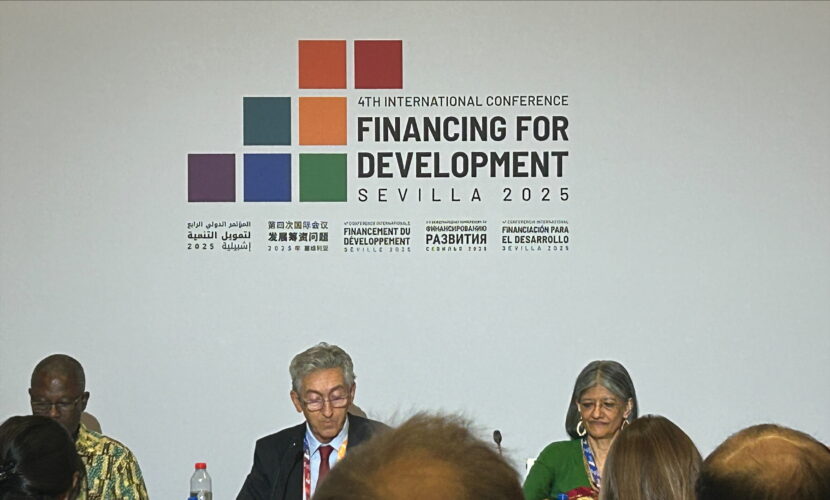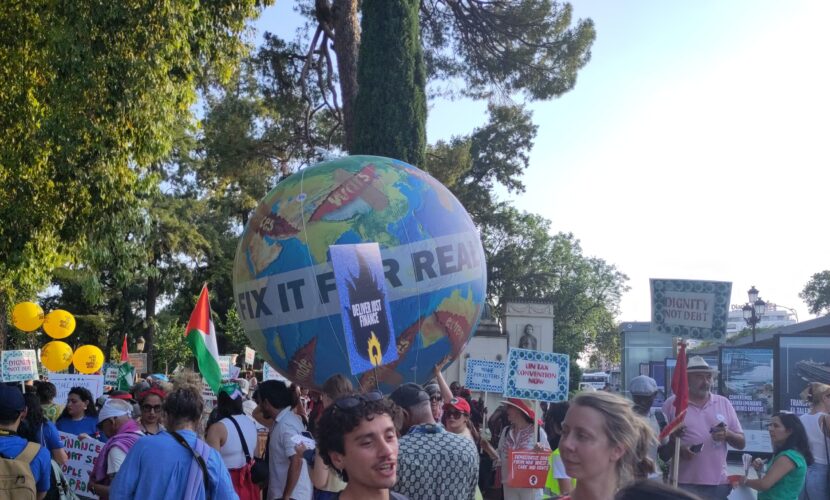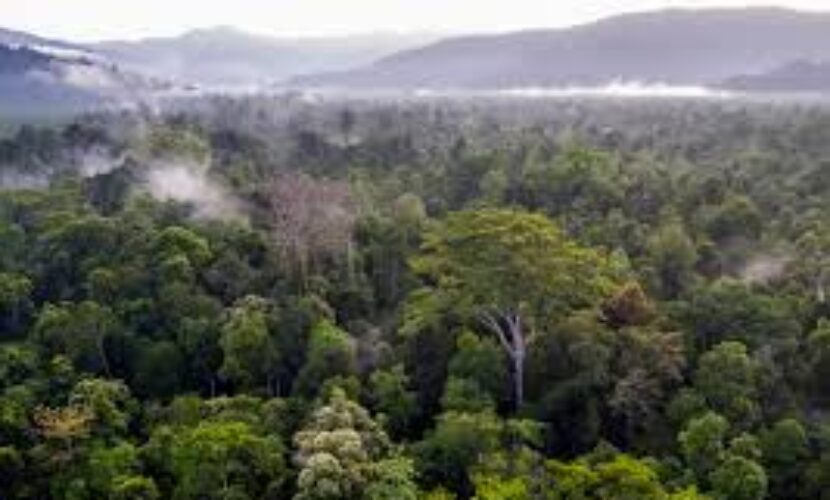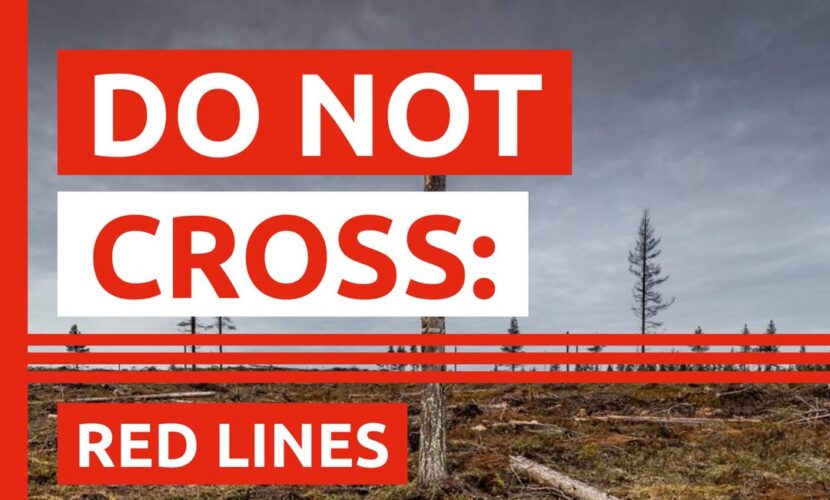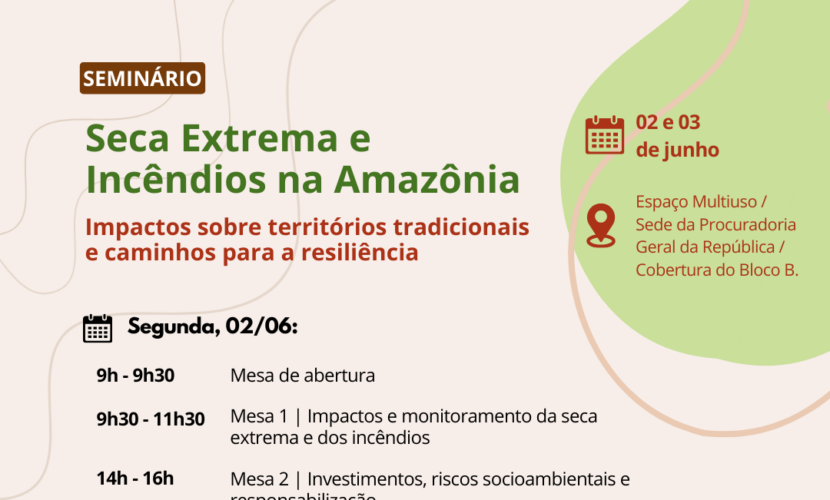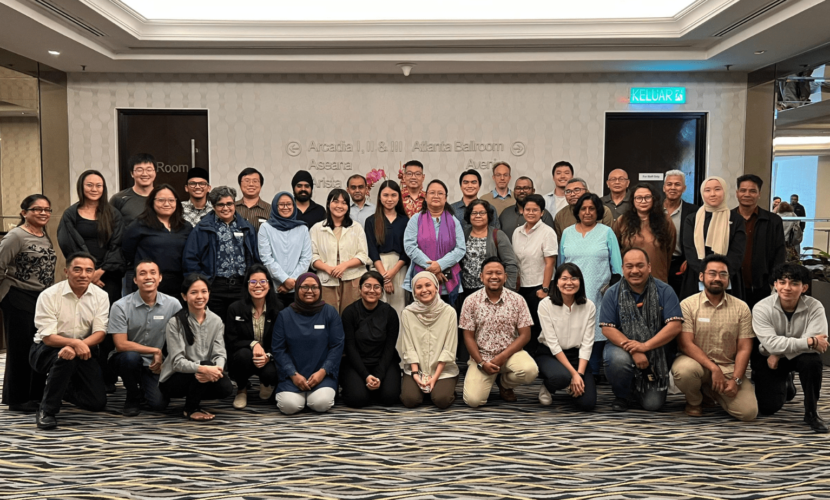News
Despite billions tied to clean supply chains, China’s Cofco still turns to deforesters
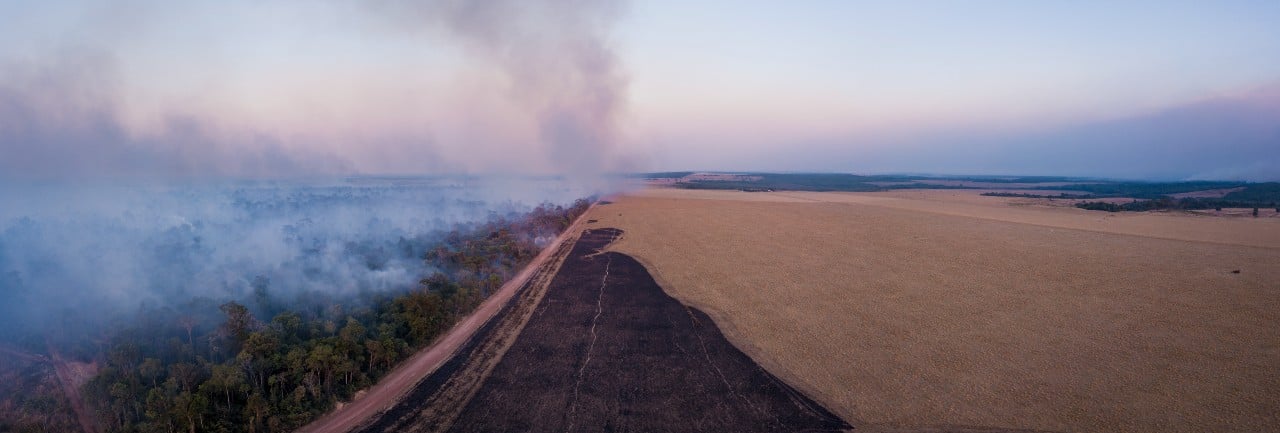
Published by Mongabay
- Cofco is a state-run Chinese company with a mission of importing enough food to feed the country’s 1.4 billion people.
- In recent years, it has made bold pledges about combating deforestation and has adopted a series of policies to clean up its supply chains, receiving billions of dollars in reduced-interest loans to carry out these promises.
- But Cofco’s supply chains are still not free of deforestation, an investigation by investigative outlet Repórter Brasil produced in partnership with the Pulitzer Center’s Rainforest Investigations Network has found.
MATO GROSSO, Brazil — João Luiz Lazarotto was indignant.
Seated in the corporate office of his 9,520-hectare (23,524-acre) farm in Mato Grosso state, Brazil, Lazarotto explained his problem. His biggest client was refusing to buy some of his soybean harvest because of the Soy Moratorium, an agreement among soy traders barring them from buying soy grown on deforested land in the Amazon region. His crop was being rejected even though he’d gotten state approval to cut down forests on the land he owns and farms.
“I deforested within the law,” Lazarotto said. “Now, because they can’t sell it, I have to take that soya out.”
He contrasted these demands with the approach of his second-largest buyer, a corporate behemoth called Cofco, the Chinese Oils and Foodstuffs Corporation. Cofco, he said, was conducting business as usual and had so far imposed no such requirements — despite also being a signatory to the Soy Moratorium.
“Still no [change],” Lazarotto said.
Cofco is a state-run giant with a critically important mission: it is the leading food supplier to the planet’s most populous country. The company imports grains, oils, sugar and meat from around the world to help feed 1.4 billion people. Its trading wing, Cofco International, has emerged as a global agribusiness powerhouse alongside U.S.-based multinationals Cargill and ADM.
In recent years, Cofco International has made bold pledges about combating deforestation. It has adopted a series of policies to clean up its supply chains, and received billions of dollars in reduced-interest loans to carry these promises out.
The company’s environmental efforts have won praise from industry insiders.
Bernardo Pires, the sustainability manager for the Brazilian soy industry association ABIOVE, described Cofco as one of the most responsible companies in the sector.
“They’ve done a good job in the areas of sustainability, with commitments and traceability,” Pires said. “It’s a pleasant surprise. Because in theory the European companies are leading, but they are at the same level.”
But the supply chains that Cofco has built to ensure the food security of a superpower are still not free of deforestation, an investigation by the Brazilian investigative outlet Repórter Brasil in partnership with the Pulitzer Center’s Rainforest Investigations Network has found. Cofco’s purchases from Lazarotto are one of three cases examined in detail, involving soy from Brazil and palm oil from Indonesia, where Cofco’s commodity-trading unit has sourced from farms implicated in the destruction of tropical forests. These farms are among more than a dozen run by Cofco soy and palm oil suppliers that have been sanctioned by governments or other traders for deforestation and other environmental infractions.

Experts say the breaches raise concerns about whether the company is living up to its commitments.
“The Cofco policies say a lot of things,” said João Shimada, a senior policy analyst at the Earth Innovation Institute, a Brazil-based research organization, who reviewed the investigation’s findings. “It’s not clear what kind of mechanism to implement or to comply with the company’s policy is in place.”
For the world’s rainforests, the stakes are high. As of 2017, China accounted for nearly a quarter of all deforestation linked to international trade, surpassing the U.S. and the European Union combined, a report by WWF found.
As a major state-run company, Cofco’s lapses raise questions about whether China can develop supply chains that can feed its huge population while significantly reducing the massive deforestation footprint of these imports.
Isabel Nepstad, a China-based environmental consultant who advises government and private sector clients on sustainability, said the rule of law is strong in China and companies will comply if the government imposes new regulations. But concerns about food security are currently taking precedence over climate goals, she said.
“China really shies away from making a clear commitment on deforestation,” Nepstad said. “We’re not going to be seeing anything mandatory from China, especially with the Russia-Ukraine conflict.”

An ‘ethical imperative’
In January 2019, Cofco chairman Jun Lyu said there was no time to lose in transforming agriculture to protect the planet.
“The ethical imperative for action is unequivocal,” Jun wrote to fellow business leaders at the elite World Economic Forum. “Together we can scale up deforestation-free and sustainable commodity supply chains.”
Six months later, Cofco International announced a $2.3 billion sustainability-linked loan from a group of 21 leading banks. These loans offer reduced interest rates if companies meet predetermined environmental targets.
It was the largest ever sustainability-linked loan signed by a commodity trader, and set the stage for the company to reap billions more in similar loans.
The company has rolled out an array of policies designed to deliver on its sustainability pledges.
These include requirements for soy suppliers to comply with the Soy Moratorium and produce deforestation-free crops in the Amazon region; palm oil suppliers to respect protected and high-conservation-value areas; and for all suppliers to follow environmental laws and regulations. The codes specify that these rules apply to both direct and indirect suppliers.
In its 2021 annual sustainability report, Cofco International announced that it had achieved all of the key benchmarks for its $2.3 billion sustainability-linked loan, unlocking lower interest rates.
Cofco and the key banks that have financed its sustainability-linked loans — including Spanish lender BBVA, HSBC and Standard Chartered of the U.K., the Bank of America, and Japan’s SMBC — declined to comment on the specifics of these benchmarks, saying it was confidential business information.
As a Chinese state-run company, Cofco’s approach also has larger implications.
In recent years, President Xi Jinping has preached the concept of “ecological civilization,” a phrase meant to signify sustainable development based on Chinese principles. At the 2021 U.N. climate summit in Glasgow, Scotland, China issued a joint declaration with the United States that included a pledge to crack down on imports of commodities linked to illegal deforestation. Its environment ministry created a unit called the Global Green Value Chain Institute to clean up supply chains.
Experts say China usually tests new policies through pilot programs before rolling them out more widely. If successful, Cofco’s efforts to trace its soy supply chains could pave the way for more systemic action from China.
But Cofco’s central mission is ensuring China’s food security.
Food security is a vulnerable area for the rising superpower, which suffered the deadliest famine in human history from 1958 to 1962, which left up to 55 million people dead. Since Xi assumed power in 2013, guaranteeing China’s food supply has been at the top of his agenda. Throughout his presidency, the first policy statement issued by China’s top authorities each year, known as the No. 1 Document, has focused on food security and farmland preservation.
Since China cannot grow enough food domestically to feed its 1.4 billion citizens, Cofco must step into the breach.
“Cofco shall resolutely carry out Secretary General Xi Jinping’s important instructions and undertake to ensure China’s grain security and food security,” Zhao Shuanglian, then-chairman of Cofco, said in 2016.
But ensuring food security and cleaning up supply chains aren’t automatically compatible goals.

Mato Grosso and Cofco
Mato Grosso is Brazil’s farm country.
Wide open fields stretch out to the horizon. Silos rise above single-road towns huddled around stretches of highway. Trucks and four-by-fours dominate the roads.
Last September, car windows and buildings were decorated with Brazil’s green and yellow flag, a symbol of support for Jair Bolsonaro, the incumbent president. An admirer of Donald Trump who embraced agribusiness as his political base, Bolsonaro was narrowly ousted in Brazil’s presidential election last October.
Mato Grosso’s farms and ranches, including some of the state’s biggest soy producers, have been tied to large-scale deforestation. Soy farms cleared more than 500,000 hectares (1.24 million acres) of native vegetation in Mato Grosso from 2008 to 2019, of which more than 90% was done illegally, according to a 2022 analysis by the local environmental group Instituto Centro de Vida.
A review of purchasing records between Cofco and 86 of its soy suppliers in Mato Grosso, brokered by the trading firm Nutrade Comercial Exportadora, found that 15 suppliers had been fined or embargoed for recent violations of state or federal rules. At least five and as many as 11 of those 15 suppliers were under an active embargo during the time Cofco did business with them.
Using satellite images, state and federal records, and site visits, this investigation took a closer look at Cofco’s purchases from two suppliers with a history of deforestation and then-current restrictions from the state or federal governments or the soy industry on sales.
João Luiz Lazarotto’s farm in Mato Grosso deforested 650 hectares (1,600 acres) in 2017, according to satellite images and his own statements to reporters on this investigation. This deforestation was permitted by Mato Grosso authorities, but violated the Soy Moratorium.

Sales documents show Lazarotto’s farm delivered soy to Cofco in February 2021 in a deal brokered by Nutrade. In September 2022, Lazarotto told this investigation that Cofco was his second-largest buyer.
Cofco initially denied having purchased soy from Lazarotto’s farm. After reporters on this investigation shared the 2021 sales records, it said those purchases didn’t come from the deforested area of his property, but from a different section registered separately with the state. It said its February 2021 purchases couldn’t have come from the recently cleared tract because that zone was harvested later in the season — a claim confirmed by satellite images shared by Cofco.
But when asked about its role as Lazarotto’s second-largest buyer — a direct and more lucrative commercial relationship, according to Lazarotto’s statements — Cofco didn’t respond. The company also didn’t answer questions about whether it monitored its purchases from Lazarotto’s farm to ensure they originated in the section without deforestation.
Visits to the farm by journalists from Repórter Brasil show that the two sections of the farm are connected, and satellite images show that it only has grain silos in one of the two sections — in the area without the disputed status. In other words, soy from both plots may be stored together.
Buyers are obliged to conduct additional due diligence to ensure they’re not buying tainted products when purchasing from landowners with environmental violations, experts say.
“If it is the same farm there is no excuse for Cofco,” said Marco Mantovani, an expert on Amazon deforestation with the environmental group Global Witness.
Lazarotto called the Soy Moratorium unjust because it goes further than Brazilian law, and that he sells the soy he grows on legally deforested areas to buyers willing to accept it. He said he’ll continue clearing forests on his property as allowed by law.
“I have the right to open another 350 hectares [865 acres],” Lazarotto said. “And I will open those 350 hectares, given that the law permits it.”
The Soy Moratorium has pushed production south, away from the Amazon and into the vast savanna biome of the Cerrado. Here, a three-hour drive southeast of Lazarotto’s farm, Cofco purchased soy from a supplier under an active embargo for illegal deforestation.
The deal, again facilitated by Nutrade, was made in February and March 2021 between a Cofco International subsidiary and the Uggeri Agropecuaria farm.

The farm had received a permit in 2012 to clear nearly 1,000 hectares (2,500 acres), but deforested beyond those boundaries. In 2015, the Mato Grosso state environmental agency imposed an embargo that banned the farm from growing crops in areas it had cleared illegally, as well as imposed fines of more than $40,000.
But satellite images show that Uggeri Agropecuaria continued to grow soy within the embargoed area through the time of its sales to Cofco, a violation of Cofco’s requirements for suppliers, according to experts that analyzed the case.
Cofco explained its purchases from Uggeri Agropecuaria the same way as the case involving the Soy Moratorium: The soy it bought came from a section of the farm that was registered separately from the areas under embargo, it said, and therefore did not violate its commitments.
But as with Lazarotto’s farm, satellite images again showed that the different sections of the property were contiguous. No fences or boundaries separate the embargoed section from the area where Cofco said it sourced its grains from. In some areas, the same fields straddled parts of both sections.
Agropecuaria Uggeri didn’t respond to phone and email inquiries for comment.
Cofco didn’t answer questions about whether it had set any conditions or conducted due diligence to ensure its purchases didn’t include crops grown in the illegally cleared zone.
But the company said it takes numerous measures to monitor and enforce its supply chain standards.
These include risk assessment of farms conducted using satellite images, automatic controls that block suppliers associated with social and environmental risks, and annual external audits. The company noted the cases cited in the investigation related to indirect purchases rather than its direct suppliers, and said strengthening this area of its supply chain is a priority for the company.
“Currently, we are working to increase traceability of indirect purchases, which will lead us to strengthen our controls and risk monitoring for this part of the supply chain,” Cofco said.
Experts say Cofco’s lack of due diligence once again left the company exposed to deforestation. Beibei Yin, a senior adviser on China policy for Global Witness, who reviewed the investigation’s findings, said the cases in Brazil indicated a major gap between Cofco’s goals and its current performance.
“The company seems to be far from achieving its core ambition about achieving a deforestation and conversion-free soy supply chain by 2030,” Yin said.

The ‘orangutan capital of the world’
The lush rainforests of the Rawa Singkil Wildlife Reserve are alive with Sumatran tigers, elephants and rhinos. The orangutan population is so dense that this sanctuary in Indonesia’s Aceh province has been called the “orangutan capital of the world.”
Yet within the reserve’s boundaries, an illegal oil palm plantation has spread. The land occupied by the plantation was once covered in forests, satellite images show. Some of the worst destruction occurred in 2017, a year after Indonesia declared a moratorium on deforestation by oil palm growers.
In May 2022, trucks loaded with oil palm fruit left the illegal plantation and sold the commodity into a supply chain that extends across the world. One of the first stops was a palm oil mill run by the company Samudera Sawit Nabati, which bought the fruit from the collection point where the illegal cargo was delivered, according to purchase receipts obtained in an undercover investigation by the Rainforest Action Network.
Among the companies that source palm oil from the mill is Cofco International.
“Cofco continues to do business with suppliers that are in active violation of its policy,” said Gemma Tillack, forest policy director for the Rainforest Action Network.
Last year’s investigation wasn’t the first time the Rainforest Action Network has exposed Samudera Sawit Nabati for illegally sourcing palm fruit from inside the Rawa Singkil reserve. The environmental group found in 2019 that the mill bought fruit grown illegally inside the sanctuary, this time from a different plantation.
The fallout from these revelations prompted the consumer goods giant Unilever to place the company on its list of suspended or banned palm oil suppliers, a blacklist of mills that have sourced palm fruit or oil from plantations involved in recent deforestation.
But Cofco continued to buy from there, according to lists of supply mills disclosed on its website. Ten mills that had been suspended or banned by Unilever were among Cofco’s most recent list of suppliers, which covers the year 2021. At least three of these mills have been linked to allegations of illegal deforestation or land grabbing.
Cofco said it was unaware of both cases of illegal deforestation linked to the Samudera Sawit Nabati mill, which is one of nearly 1,000 included on its most recent supplier list. It said its direct or “tier-one” supplier was the food-processing giant Wilmar International, which refined the palm oil produced at this mill.
“Considering the lack of knowledge, there was no valid reason for us to engage our tier-one suppliers about the presence of this mill in our mill list,” Cofco said in a statement.
The parent company of Samudera Sawit Nabati, the Duta Marga Group, did not respond to repeated phone inquiries for comment.

A failure to act
Cases in which deforestation still slips through don’t mean that Cofco’s strategy is the wrong one, or that it isn’t committed to improvement. But experts say the episodes revealed by the investigation show flaws in Cofco’s approach. These include a lack of proactive due diligence systems, weak oversight of indirect suppliers, and a failure to spell out its own obligations in the case of noncompliance, according to Yin of Global Witness.
“They should be actively carrying out due diligence on the suppliers and exclude the noncompliant ones,” Yin said.
The problems also reflect what experts describe as a broader lack of action on the part of the Chinese government.
China’s reliance on Brazil to meet its food supply needs means it will be careful not to antagonize the country with its policies, experts say. But political events in Brazil may be changing its calculus. In January, the Brazilian presidency passed from Bolsonaro, a fierce opponent of environmental regulation, to Luiz Inacio “Lula” da Silva, who campaigned on a pledge to stop the destruction of Brazil’s rainforests.
In a joint statement during Lula’s state visit to China in April, the two nations agreed to cooperate on “eliminating global illegal logging and deforestation” by enforcing existing laws and collaborating on satellite monitoring.
But until China and Brazil can cut deforestation out of their lucrative trade in soy, beef and other commodities, companies like Cofco will face an uphill battle in cleaning up their supply chains.
So far, neither country’s promises have translated into a new way of doing business, said Shimada of the Earth Innovation Institute.
“We don’t have practical consequences in the field,” Shimada said.
Poliana Dallabrida, from Repórter Brasil, contributed with reporting for this story.
Banner image: The state of Mato Grosso is one of Brazil’s grain baskets and has some of the highest deforestation rates in the country. Image courtesy of Fernando Martinho / Repórter Brasil.
